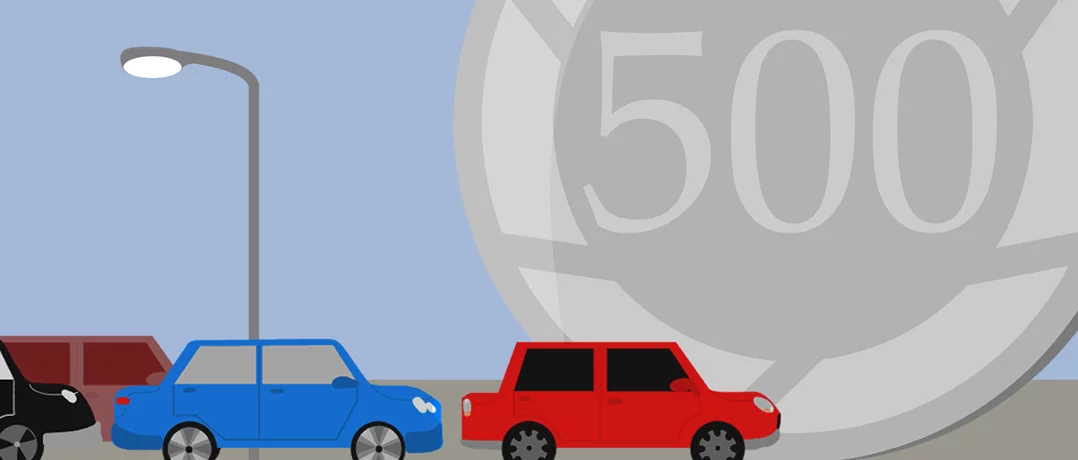Lebanon’s worsening traffic crisis drains its economy and demands urgent sustainable transport solutions.
Stuck in traffic, losing millions

As Lebanon searches for any spark that could ignite economic growth and lead the country toward a brighter era, studies and figures reveal a sobering reality: the engines that never stop running on the nation’s roads are, in fact, draining its economy at an alarming rate. While congestion plagues most of the world’s major cities, in Lebanon it has evolved into a national crisis, one that threatens both the quality of life and economic productivity.
So what lies behind this gridlock? What do the numbers reveal about its cost? And are there sustainable solutions?
Poor planning, urban chaos... and trucks
What keeps Lebanon’s roads perpetually gridlocked is a tangled web of systemic weaknesses and circumstantial challenges. Every day, commuters and officials battle the congestion, paying the price in wasted time, money, and diminished efficiency.
According to Kamel Ibrahim, head of the Lebanese International Road Safety Academy,
the main reason for Lebanon’s traffic congestion is the lack of planning, which has led citizens to rely almost entirely on private cars for transportation, causing an overwhelming number of vehicles on the roads.
In an interview with The Beiruter, Ibrahim also pointed to urban chaos, with commercial shops built too close to main and secondary roads, the absence of service roads to regulate traffic flow, and the lack of a functional traffic management center. He added that unregulated truck movements, random parking, broken traffic lights, and valet parking operations, especially in Beirut, all worsen the problem.
12 years of work wasted every day… $236 million lost every year
Lebanon’s traffic crisis extends far beyond the roads, it affects every aspect of citizens’ daily lives. The average commuter spends hours on the move, leading to chronic psychological exhaustion. Psychologists confirm that traffic congestion increases anxiety levels by over 40% among drivers in Lebanon. Health-wise, prolonged exposure to air pollution from vehicle emissions directly harms the respiratory system. Environmental studies show that the concentration of fine particulate matter in Beirut’s air exceeds global safety limits by threefold, posing a severe health threat. On the economic level, the World Bank and related studies estimate that Lebanon loses over $2 billion annually due to traffic congestion, the equivalent of 5 to 10% of GDP, while more than 80% of Lebanese rely on private vehicles for their commutes.
Financial expert Nicolas Chikhani, in a study prepared for The Beiruter, analyzed the impact of congestion on citizens’ productivity. He explains:
“The 20-kilometer stretch between Beirut and Jounieh can fit 9,000 cars carrying around 18,000 passengers (two per car), and if each person spends an extra two hours daily in traffic, that’s 36,000 wasted hours per day, equivalent to 4,500 working days at 8 hours each. In other words, it is as if one Lebanese citizen loses 12 years of labor every single day on that stretch of road alone.”
Chikhani continues: “If we assume the average monthly salary is $1,500, each employee should generate around $4,500 in added value for their company. Over a year, that’s $54,000 in productivity, and over 12 years, around $648,000. When multiplied by the number of days in a year, the total annual productivity loss reaches approximately $236 million, all wasted in traffic.”
A spreading cancer... Jounieh’s highway expansion a real fix?
Ibrahim likens finding a solution to Lebanon’s traffic to “treating cancer in its advanced stages,” but insists that the obvious starting point is reducing the number of cars on the roads.
“In many countries, expanding road networks has only encouraged more car use, bringing congestion back full circle,” he says. “But those that promoted alternative transport, buses, metro systems, railways, saw lasting improvements.”
Among the proposed solutions, Ibrahim highlights the need to expand public transport routes to connect not only the capital but also rural and mountain areas. He also points to e-government projects as a way to cut down citizens’ need to visit administrative offices, and remote work policies in the private sector to reduce commutes.
“The private sector,” he adds, “should encourage carpooling and provide shuttle services for employees. But ultimately, the key lies in a long-term national transportation strategy, not in short-lived initiatives by individual ministers seeking quick wins.”
Regarding the Jounieh highway expansion, Ibrahim describes it as “necessary and useful in the short term,” noting that
it will organize traffic and improve pedestrian safety, though it won’t solve the problem in the long run as vehicle numbers continue to rise.
Every day spent in Lebanon’s traffic is time lost, productivity wasted, and stress added to an already burdened population. The congestion is more than a gridlock of cars, it is an economy groaning under pressure and a way of life being slowly eroded.
The solutions exist, but time is no longer on Lebanon’s side: either the state acts to implement sustainable reforms, or the country’s roads will soon lead everyone to a dead end.



